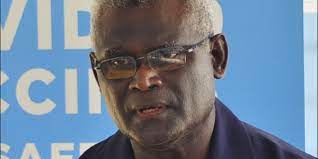A key adviser to the premier of the most populous province in Solomon Islands has expressed concern that the China-Solomons security deal could enable the prime minister, Manasseh Sogavare, to use Chinese armed police and military personnel to quash democratic dissent and hold on to power for years to come.
Celsus Irokwato Talifilu, who is an adviser to Daniel Suidani, the premier of Malaita province, said that while it was “fair” that Australia, the U.S and other regional partners had focused their attention on the prospect of a military base on the islands, the major fear for many in Solomon Islands was the erosion of democracy.
“My main fear is [Chinese military or police personnel] put [Sogavare] in power for a long time,” he said.
“People say we are a democratic country, of course it is. But when you have a force bigger than anyone else in the Solomons, it will be easy for him to use that force to support him and his ministers or those who are in government to ensure they come back at the next elections.”
The comments came as Australia’s spy chief said Canberra was concerned Chinese police deployed to Solomon Islands under a new security pact could use “ruthless” techniques previously used to quell anti-government protests in Hong Kong.
“In such a fragile, volatile country Chinese policing techniques and tactics that we’ve seen deployed so ruthlessly in Hong Kong, for example, are completely inconsistent with the Pacific way of resolving issues and could incite further instability and violence in the Solomon Islands,” said Andrew Shearer, the director general of the Office of National Intelligence, who travelled to the Pacific islands nation in March in a failed attempt to persuade Sogavare not to sign the agreement.
The text of the security deal, which was signed last week, has been kept secret, with Sogavare saying he will only release it with China’s permission, something that has alarmed Solomons MPs who have called for it to be made public.
A leaked draft of the deal detailed broad conditions under which Solomon Islands could call upon China for armed police and military personnel, including “to assist in maintaining social order, protecting people’s lives and property, providing humanitarian assistance, carrying out disaster response, or providing assistance on other tasks agreed upon by the parties [to the agreement]”.
Talifilu was speaking as he accompanied Suidani on a tour of Malaita, which is home to roughly a quarter of Solomon Islands’ population.
There are tensions between the national government and Malaita, which has serious economic challenges and does not feel it has received adequate support from the national government to address them. Malaita did not support the Sogavare government’s decision in 2019 to switch diplomatic allegiance from Taiwan to China. Unhappiness with Sogavare over the switch was part of the motivation for riots in Honiara in 2021.
Talifilu said that during the tour, many people across the province had raised the issue of the China security deal.
“People ask about it,” he said. “And they are fearful to be honest … It’s a big discussion in communities, wanting to know how is this going to affect us.”
Talifilu said the fears boiled down to two things: firstly, that in the event of hostilities between the US and China, “we will be caught in the conflict”.
Secondly, the prime minister’s ability to call on the Chinese for support to deal with internal security issues was seen as targeted at Malaita, given the historical tensions.
“It’s known that Malaita province stood against China coming into our province … so they know that the emphasis on security, internal security, is an emphasis against Malaita,” he said. “So if it so happens that the Chinese are in Honiara or are invited to do things, it will be against Malaitans.”
These concerns were echoed by the opposition leader Matthew Wale, who told the Guardian: “I think the deal is targeted at Malaita and that’s also the perception on Malaita.
“So that is a real threat to the unity of this country and certainly internal stability.”
Talifilu said that it was understandable that foreign countries like Australia had focused on the prospect of a Chinese naval base being built on Solomon Islands.
He warned that while Sogavare had repeatedly said there would be no Chinese military base, the assurances should not be trusted, as the prime minister had “not been truthful” in the past, including in the lead-up to the change in diplomatic allegiance in 2019.
“He promised people, including foreign governments, before any switch that there would be thorough consultations and that includes reports from within government to inform the government of the pros and cons or the switch from Republic of China to PRC. He ended up not doing that. So those experiences for me have taught me that this man is the kind of person that you can’t trust.
“It’s fair to say that people should be worried. Why? Because why should we trust him now?”
Sogavare, prime minister of Solomon Islands, was contacted for comment.
SOURCE: THE GUARDIAN/PACNEWS














